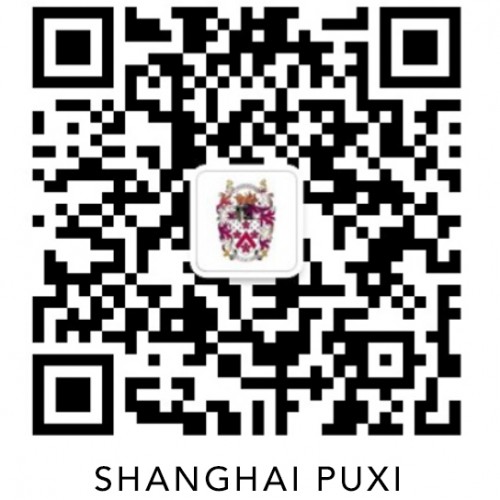The Secret to Learning Mathematics in the 21st Century
"Solving problems is a practical art, like swimming, or skiing, or playing the piano: you can learn it only by imitation and practice."
- George Pólya
Tomorrow, 10 students from across our High School and Year 12 will take part in the Senior Maths Challenge run by the UK Mathematics Trust. Keen problem solvers from around the world will test their ingenuity against some of the toughest problems that can be solved using GCSE-level mathematical knowledge. The difficulty of these problems is not in having the skills to solve them, but in knowing which skills to use. This selection and application of knowledge is exactly the kind of life-long skill that will enable our students to excel in a wider range of interests and careers.
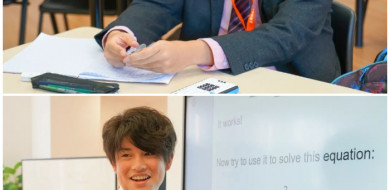
Competition is an important part of our Senior School culture. We foster a desire in students to do the best they can against unfamiliar problems, which is one of the most effective ways to improve critical thinking and build resilience. Last year students from Year 9-11 took part in the Intermediate Maths Challenge aimed at pupils up to Year 11, and this is our school’s first entry to the Senior Maths Challenge. We achieved incredible results with over 70% receiving a Bronze certificate or higher, and our top scoring pupil Aidan (Year 11) went on to enter the Maclaurin Olympiad for the highest scoring 600 students worldwide and achieved a merit. Additionally, our Year 7 and Year 9 students also entered teams for the SISMAC competitions in Shanghai, competing against several other international schools. Our students proved themselves to be formidable problem-solvers and creative thinkers in a huge range of activities, with our Year 7 team placing second overall.
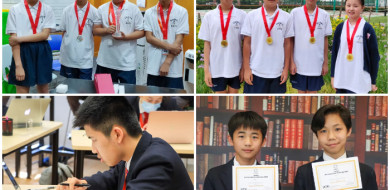
At Dulwich College Shanghai Puxi, students engage in deep investigations and conversations about the uses of mathematics. They build on and extend their existing skills to discover new concepts and find their best applications. A great example of this is the recent Year 8 unit studying the concept of Magnitude. Students started by creating their own research question involving estimation and then went on to reflect how accurate these approximations were. We had groups researching a huge variety of ideas from ‘How many Maine Coon cats could fit on the school field?’ (about 40500!) to ‘How many marathons could I run in a lifetime?’. We also considered how professions such as event organisers use these kinds of approximations in order to plan effectively for large scale events. Students then considered how to determine their level of accuracy by identifying any assumptions they had made and comparing the ways in which they had used rounding. Finally, students found relationships between the accuracy of calculations with very small and very large numbers and the effect that using significant figures has on maintaining consistency across such a broad range of numbers.
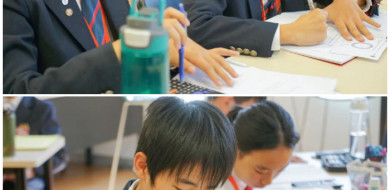
Learning in mathematics is not just about developing higher level algebraic techniques and calculating accurately. Indeed, the IB states that students of mathematics should “develop logical, critical and creative thinking”, “employ and refine their powers of abstraction and generalisation” and are encouraged to “appreciate the international dimensions of mathematics and the multiplicity of its cultural and historical perspectives”. Additionally, in the most recently published list of “Top 10 Skills of 2025”, critical thinking and problem-solving topped the list (The World Economic Forum, 2020). Our maths curriculum is designed to develop this thinking throughout the Senior School, and to encourage independent lines of inquiry to fully support students’ individual interests and development.
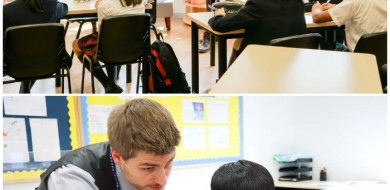
Large scale questions and investigations are not just a way of engaging pupils in the curriculum, they also allow students to see the uses of their mathematical skills in the real world and give them an understanding of the applications and limitations of mathematical modelling. Last year we had Year 10 students on the school field calculating the height of the floodlights using trigonometry, and Year 11s optimising the amount of fuel required for a rocket launch. Embedded in all of this is a rigorous approach to skills development and assessment that ensures all students can challenge themselves at an appropriate level and solve large scale problems in a way that ensures they will learn something new.
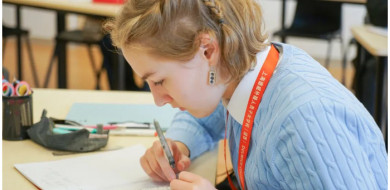
Isabel, Year 12
“I enjoy that learning maths at Dulwich is interactive and you get to have discussions with the other members in the class. I really like how it allows for the development of critical thinking and investigative skills.
The Tower of Hanoi investigation was particularly interesting because it allowed for the use of experimentation to think about the problem and it felt like we could see what was happening more clearly than by writing algebra. But then it also helped me see how to algebra can be applied to real-life problems.
I feel challenged in all maths lessons! Especially at IB, the challenge inspires me to investigate it more and to think about it more than if it just came easily."
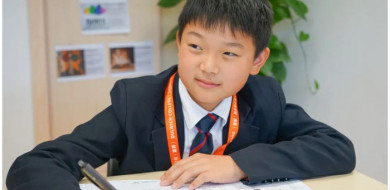
Otto, Year 8
“Assessments at Dulwich help us think about what we’ve done this year and how we can improve. We can focus on what we do not understand and see what we did wrong, so we can go back over our notebooks and ask questions to improve.
When I’m learning algebra and having little competitions between classmates, it can be really hard. I feel like after I have challenged myself I have done more and I have learned from it."
Our students have the capability to stand among the best in the world at problem-solving and are keen to prove it in their competitions. We wish them all the best for tomorrow and for the SISMAC competitions later in this academic year!
References
Pólya, G. (unknown date), www.goodreads.com
Whiting, K. (2021) “These are the top 10 job skills of tomorrow – and how long it takes to learn them” www.weforum.org/agenda/2020/10/top-10-work-skills-of-tomorrow-how-long-it-takes-to-learn-them
International Baccalaureate. (accessed November 2021) www.ibo.org/programmes/diploma-programme/curriculum/mathematics





